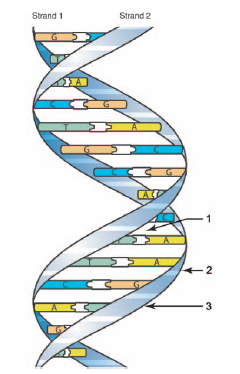Basic BiologyCells |
What is a chromosome? |
A chromosome is the threadlike part of a cell that contains DNA and carries the genetic material of a cell. In prokaryotic cells chromosomes consist entirely of DNA and are not enclosed in a nuclear membrane. In eukaryotic cells the chromosomes are found within the nucleus and contain both DNA and RNA (ribonucleic acid).

A DNA molecule is comprised of sequences of four molecules. In the above chart, C = Cytosine; G = Guanine; A = Adenine; T = Thymine; 1 = Hydrogen bond; 2 = Phosphate group; 3 = Deoxyribose sugar. (From Premkumar K. The Massage Connection Anatomy and Physiology. Baltimore: Lippincott, Williams & Wilkins, 2004.)
